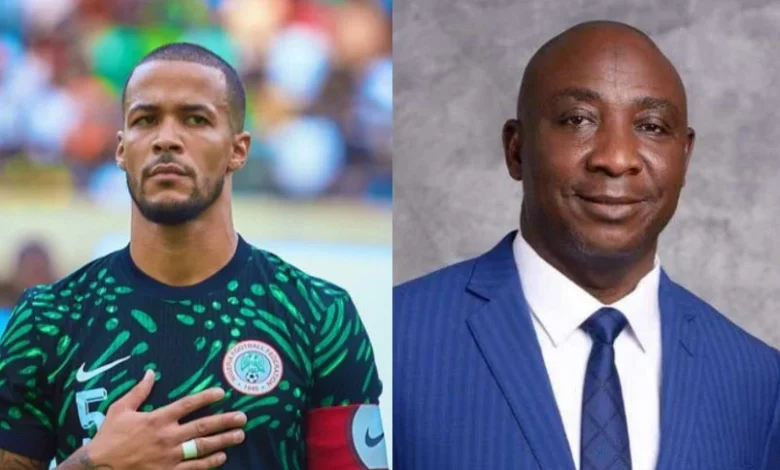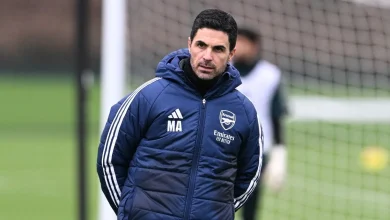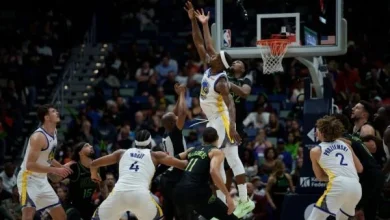Super Eagles revolt in Morocco exposes NFF’s long history of broken promises

As Nigeria’s Super Eagles prepare for one of their most crucial assignments in two years — the 2026 FIFA World Cup African playoffs in Morocco — the team has been plunged into yet another avoidable crisis.
On Tuesday, the players and officials boycotted training over years of unpaid bonuses and allowances, exposing once again the Nigeria Football Federation’s (NFF) chronic failures in managing players’ welfare.
The squad, led by captain William Troost-Ekong, refused to train in Rabat, citing unresolved financial commitments stretching back several matches.
According to veteran BBC journalist Oluwashina Okeleji, who first broke the story, the boycott was a united decision involving the players and officials.
They are demanding payment of long-overdue allowances before returning to full preparation for Thursday’s semi-final clash against Gabon.
Sources in Rabat said that, as of Tuesday night, the players had vowed not to play until the NFF cleared all outstanding debts.
Executives of the National Sports Commission (NSC), PREMIUM TIMES gathered, have contacted the team leaders, and some funds have reportedly been released to the NFF.
One of the journalists on the ground in Rabat, Sulaiman Pooja Adebayo, clarified that the dispute is not merely about immediate payments. “The players are fighting for the new generation,” he said.
“They want the NFF to be responsible going forward. This fight is beyond unpaid allowances; it’s about the future of football in Nigeria.”
Super Eagles (CREDIT: NFF Media)
A long shadow of broken promises
The Super Eagles’ current protest fits into a familiar and deeply embarrassing pattern that has trailed Nigerian football for decades. Successive national teams — from the 1994 heroes to the class of 2018 — have faced similar episodes of neglect and delayed payments, often on the eve of major tournaments.
Across the age-grade teams and even among the female footballers, the sad tale of broken promises and unpaid wages is even worse.
Former Beach Soccer captain Abu Azeez recalled his own experience, saying he once considered retiring from national duty because of repeated empty promises. “I finally joined camp and played so we qualified for the World Cup, but I was never paid that same money,” Azeez lamented. “This is not new. It’s a recurring wound.”
Former Super Eagles captain and ex-coach Sunday Oliseh also painted a grim picture of the NFF’s habit of reneging on promises when he appeared on Bet9ja’s Home Turf podcast.
Oliseh said that for the 2002 World Cup Qualifiers, the players agreed with the federation to split the FIFA qualification bonus equally — half for the federation and half for the 30 players featured in the qualifying campaign. “We had an agreement: $1 million was coming from FIFA. We said, ‘Okay, let’s split it 50–50 — $500,000 for the federation and $500,000 for the players,’” Oliseh revealed.
“Each player would have earned around $18,000. But the only way that money could be distributed fairly was if I, as captain, was there to ensure it happened.”
According to the former Juventus midfielder, the NFF allegedly disbanded the team shortly after qualification was secured — effectively removing key senior players, including himself and assistant captain Finidi George, from the final World Cup squad.
“To ensure that money was not paid, they eliminated me and Finidi,” Oliseh continued. “Eighty per cent of the players who went to the 2002 World Cup didn’t participate in the qualifiers. That means they weren’t eligible for that money — and it was never paid to those who earned it.”
Early warning
Journalist Osasu Obayiuwana had sounded the alarm much earlier this year when he questioned the seriousness of Nigeria’s World Cup ambitions while owing the Super Eagles bonuses for twenty matches. His words, once seen as hyperbole, now ring prophetic.
Sources close to the team revealed that the NFF had verbally promised the squad a “special bonus” a month ago, but the agreement was never formalised. “They offered, not the players,” one source clarified. “Now the federation has gone silent.”
William Troost-Ekong
Troost-Ekong calls for calm
Amid the tension, Captain William Troost-Ekong moved swiftly to steady the ship. Posting on his verified X account, he confirmed the situation but urged restraint and truth.
“Once a resolution is found, we will be the first to confirm,” he wrote. “Any other statement or especially demands other than the rightful request written about below is false. All we want and continue to do is focus on the big games ahead.”
His message was a subtle rebuke to speculative reports circulating online about fresh demands from the players. Ekong’s post also reflects the team’s collective frustration — not defiance, but fatigue from years of financial neglect that have repeatedly disrupted Nigeria’s football progress.
Administrative inertia and quiet corridors
The NFF has remained publicly silent since the boycott began. Despite growing international attention, its media team has issued no statement since Tuesday. However, insiders confirm that the federation’s president, Ibrahim Gusau, is expected to meet with the players in Rabat on Wednesday morning, following overnight consultations with officials from the National Sports Commission.
According to government sources, the NSC claims it has released additional funds to the NFF to cover outstanding obligations for the qualifiers. Whether those funds, when disbursed to the players, will calm their nerves remains unclear.
Meanwhile, goalkeeper Maduka Okoye arrived late Tuesday night, completing the 24-man squad in camp.
Yet full training had not resumed as of Wednesday morning, pending the outcome of talks between the players and the NFF hierarchy.
Bigger than Morocco
The timing of this crisis could hardly be worse. Nigeria faces Gabon in the first semi-final of the FIFA World Cup Africa Play-off Tournament in Rabat, with a potential final against either Cameroon or DR Congo determining who advances to the intercontinental playoff stage.
But beyond the immediate embarrassment, the players’ revolt has reignited a national conversation about how football governance continues to fail its biggest ambassadors.
READ ALSO: World Cup playoffs: Super Eagles boycott training in Morocco over unpaid allowances
For all the glitz around modern Nigerian stars — Osimhen, Lookman, Ndidi — their working conditions remain disturbingly unstable.
For many, the federation’s inability to settle basic entitlements undermines morale, professionalism, and public confidence — at a time when the country can least afford distractions.
As negotiations continue in Rabat, the message from the players is unmistakable: this is no longer just a fight for money, but for dignity and accountability.





